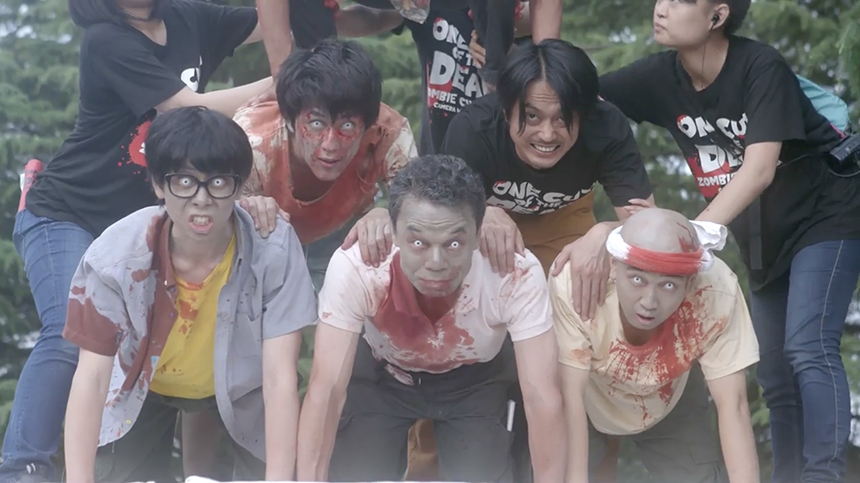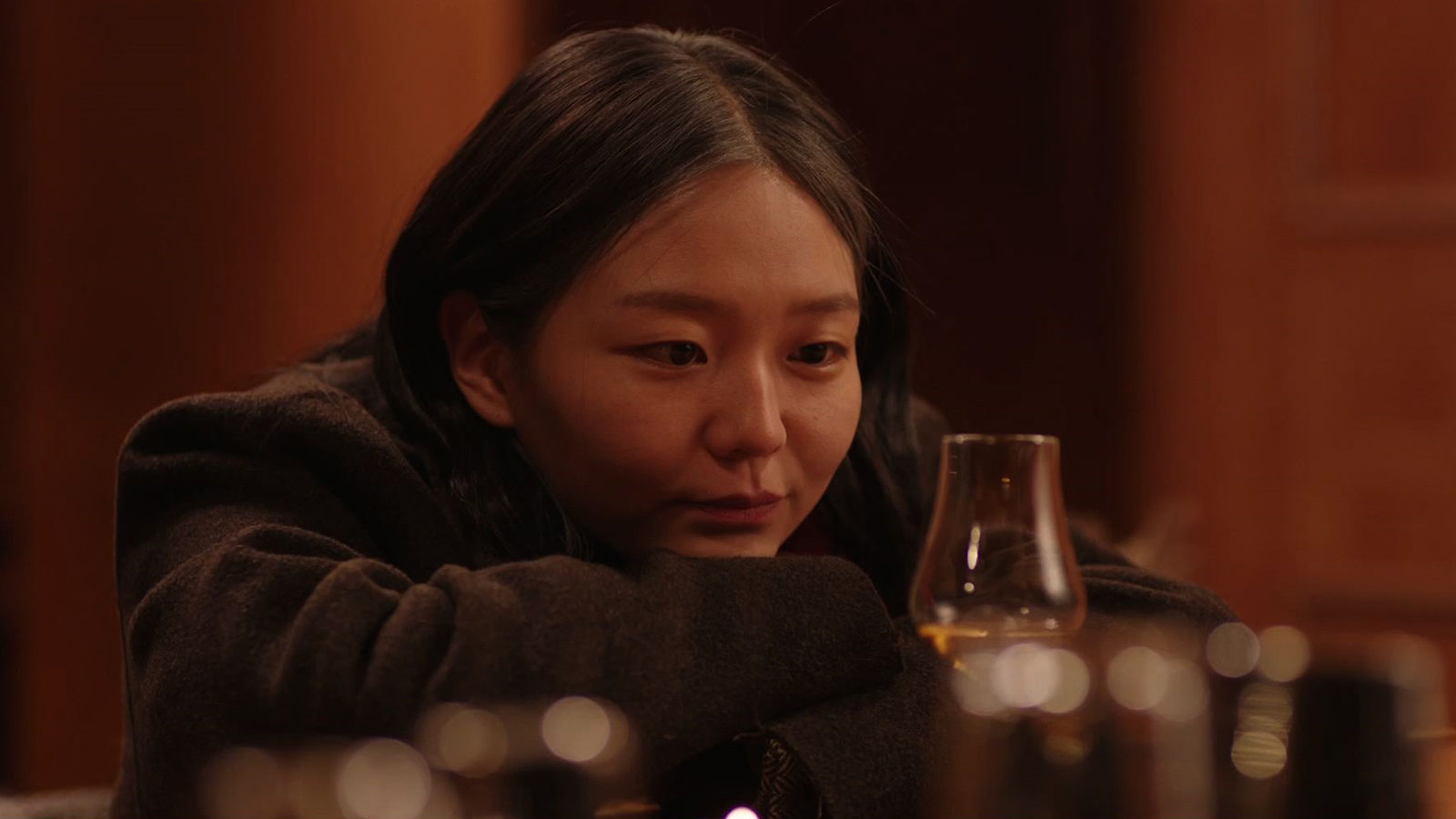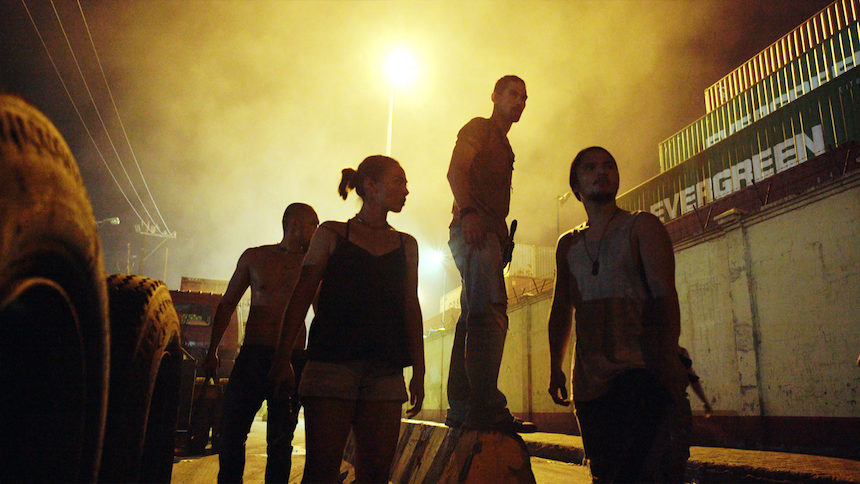New York Asian Film Festival 2018 Sneak Peek: Weird, Wild Summertime Cinema
With the summer heat on full blast this coming weekend in New York, patrons of the five burroughs may want to consider the cool and also very hip insides of a movie theater for proper retreat and enjoyment. And what better way to do this than attend the latest edition of a true NYC film culture staple: The New York Asian Film Festival! Rising from the depths of cinephillia of the far east, NYAFF roars across the city Friday, June 29 to Friday... July 15!
Opening night rolls out the North American Premiere of Masanori Tominaga's Dynamite Graffiti. Jumping to ol' 15, closing night gives us the World Premiere of Erik Matti's BuyBust, a social realist action film on the drug war in the Phillipennes. Sounds cool. But what to see? What to keep your eye on if elsewhere in the world... well, my old pals Dustin Chang, Christopher Bourne and Peter Guiterrez have you covered with this purview of mini reviews for some of the flicks playing the 2018 New York Asian Film Festival. So read on! And do be sure to check out NYAFF's site for tickets and full schedule.
Dustin Chang, Christopher Bourne and Peter Gutierrez
contributed to this story.













One Cut of the Dead
With Romero's Night of the Living Dead, the zombie genre has a humble, low-budget indie beginning. Taking the cue from this idea, Ueda Shinichiro's One Cut of the Dead serves a love letter to the indie filmmaking process as much as it works as being an entertaining zom-com.
It starts out with as an impressive 37 minute uncut zombie movie where a frazzled director screams at a young actress, who has just gone through her 42nd take. She needs to look more frightened. That she really needs to fear for life! His wish comes true soon enough, as real zombies run amok in the filming location, a large water treatment plant where the Japanese army conducted human experiment in the days of WW2.
The film rewinds and becomes a making-of documentary where it shows how the uncut movie was made in clever, comical ways. As anyone ever involved in low budget filmmaking would attest, no matter how terrible the end product turn out, there is tons of hard work and on-the-spot problem solving that goes in to each film. An interesting aside to considering: The movie gives the 'crane shot' a new meaning...
One Cut of the Dead is part zombie movie, part making-of documentary and part touching family drama. And it's hugely entertaining. -- Dustin Chang
Dukun
Dain Said’s lost film from 2006 is quite a discovery. At the center of it all is Umie Aida in the title role as a powerful female shaman on trial for murder. Coming across initially as merely vampy, Aida’s performance is actually extraordinary, more a piece of inspired dance than a dramatic turn per se. In a separate storyline, her court-appointed attorney (Faizal Hussein) is trying to track down his missing daughter. From these straightforward beginnings, things get a lot stranger… and a lot more compelling. And the solution to the mystery at the heart of events is as elegant as it is memorable. Can a lost film get a sequel? -- Peter Gutierrez
Hit the Night
Jeong Ga-young's second feature gets maximum mileage out of almost absurdly minimal material, unfolding over the course of a single evening - consisting of a dinner, hotel room drinks, and karaoke - and featuring just three principal characters. This extremely pared-down yet intricately worked-out construction, combined with its thematic concerns with the psychological, intellectual, and emotional games played out between women and men, has inevitably drawn comparisons to Hong Sang-soo. However, this belies the fact that this film's remarkably talented writer/director/star has her own unique perspective and cinematic strategies to bring to the table.
The character Jeong plays - who has her own given name, a cheeky invitation to viewers to speculate on possible parallels to extra-cinematic reality - launches a relentless verbal pursuit of a young man (Park Jong-hwan), whose early revelation that he already has a girlfriend is but a minor hiccup in Ga-young's quest to bag this gentleman. On the pretext of researching a (probably nonexistent) screenplay and film, with notepad at constant hand, Ga-young peppers her prey with questions that are almost exclusively of a sexual nature. Despite her comically intimate questioning, Ga-young is extremely sparing on personal details about herself.
Jeong injects an air of enigmatic suspense, as to whether this pickup strategy will have its intended outcome, or if it's even working at all. Jeong's character claims the purportedly feminist right to be just as predatory in her sexual pursuits as many men are. However, the teasingly ambiguous conclusion leads one to question whether the liberation engendered by this flipping of the romantic pursuit script is ultimately illusory. -- Christopher Bourne
Hungry Lion
Comprised only with short static shots that cut to black, Ogata Takaomi's Hungry Lion takes a non-sensational, clinical approach to reflect on the peril of our society completely under siege by social networking. It's very Haneke yet very Japanese.
The film begins in a high school classroom where a teacher is getting led away by the police. The video of him having sex with a student went viral. Hitomi, a normal high school student who has a considerable SNS following or someone who looks very much like her was in that video. She denies that it is her. Some of her immediate circle believe that she is innocent at first. But once the rumor starts doing rounds, it spreads fast. People turn on her and the adults who are supposed to protect her innocence openly exploit her. The gossip at the school and home become too much for Hitomi and she throws herself in front of a train.
Hungry Lion digs deeper into our relationship with the world in the internet age and how we see things in a distorted way and prey on the most vulnerable. It's a compelling movie watching experience. -- DC
Wrath of Silence
How much can we lose and still be human? That’s the question Xin Yukun’s beyond-bleak neo-noir-Western seems to be asking. The gouging and rending of flesh figures centrally, but body parts are not the only thing missing—so are children, so is morality in the face of frontier capitalism, so is justice. Using the rough and tumble world of mining as its backdrop, Wrath of Silence features the masterfully villainous Jiang Wu (who’ll be honored in person at the fest) as a character who could just as easily be a ruthless cattle baron or land-grabbing oilman. His adversary (or is he?) is a mute miner played by the utterly fierce Song Yang with antiheroic abandon and a single-mindedness reminiscent of Oldboy.To be clear, there is hope of a sort on hand, but its metaphysicality is in stark contrast to the, um, actual physicality of the rest of the proceedings. In short, the kind of movie rich in ideas that then has those ideas nearly drowned out by its towering waves of emotion. Or, put more generously, Wrath of Silence is worth seeing for both its head and its heart. -- PG
Microhabitat
Jeon Go-woon's debut (as a member of the Gwanghwamun Cinema filmmaking collective responsible for such recent Korean indie highlights as The King of Jokgu and The Queen of Crime) boasts two major assets: the beautifully soulful lead performance by actress Esom, and its elegant visual stylishness, far belying its limited budget.
Esom plays Miso (like the soup), a young woman of very limited means. She sublets a cheap unheated apartment and meticulously records her expenses, but she'll be damned if that'll prevent her from enjoying the simple pleasures of her daily pack of cigarettes and glass of fine whiskey. When a New Year's Day 2014 cigarette price increase threatens her already precarious standard of living, instead of cutting out the cigarettes and whiskey, she decides to forgo having a roof over her head instead.
Miso then embarks on a couch surfing existence, crashing at the homes of her old college friends and bandmates, all of whom are considerably more affluent than Miso. One of Miso's friends chides her harshly for being irresponsible and not behaving more like a "grownup," but her friend's lives of quiet misery hardly seem to be a more attractive option.
Unlike her friends, the film refuses to judge Miso's life choices, and can in fact be read as positively affirming Miso's rejection of a system that demands untenable sacrifices to maintain even basic standards of living. Microhabitat, among its many other virtues, is a very timely evocation of our economically challenged times. --CB
Liverleaf
Violent Japanese schoolgirls! This is what I love about NYAFF!!
Based on a manga of the same name, Naito Eisuke's Liverleaf is a school bulling revenge movie. Haruka Nozaki (Anna Yamada) is a transfer student from Tokyo in a rural town Middle School. She is relentlessly bullied by a gang of close-knit friends, headed by cool redhead Taeko (Rinka Otani). It is said Haruka stole Aiba (Hiroya Shimizu) from Taeko. How dare she!
Things take a violent turn when Rumi (Rena Otsuka), a loner who would do anything to impress Taeko, actually carries out burning down Haruka's house with her family in it. With her parents killed and her little sister in an intensive care from burns, Haruka exacts revenge on the gang, one by one, using a rusty nail, a pair of wire cutters, a crossbow and a pocket knife. As usual, nothing is more beautiful than blood on the pure white snow in the Japanese countryside -- DC
The Scythian Lamb
A quiet movie that nonetheless is bursting at the seams with pleasures big and small, The Scythian Lamb both offers surprises and is a surprise. Six offbeat newcomers arrive at a seaside town, and things get shaken up. At turns a dark comedy, a drama, and an outright thriller, Daihachi Yoshida’s film is constantly engaging, mixing its humanistic affirmations with shadowy mystery and sudden, legitimately shocking, violence. And it all works. Sure, some of the storylines are developed more than others, but the overall proportions feel right. In short, the kind of movie that will keep a small smile on your face for its entire two hours—when you’re not gasping, that is. -- PG
The Blood of Wolves
Detective Ogami (Yakusho Koji), known affectionately as 'Gami by his colleagues and yakuza friends alike, leads a colorful existence, walking a tightrope without falling to either side. He has been the key figure in keeping the peace between too warring yakuza clans. But it's Gami's method - taking bribes, getting favors, extortion, violence, etc that irks a young idealist rookie partner Hioka (Matsuzaka Tori). While investigating the murder of a civilian accountant, Hioka realizes Gami might be in too deep with Irako (Ishbashi Renji), one of the crime bosses. Would Gami find out that Hioka is an agent from internal affairs? Would they still bring down the gangs together?
As flamboyant Ogami, always dependable Yakusho is fabulous here playing against type. Without honor, loyalty or fear, his character is only interested in protecting civilians. With large, great supporting roles played by many familiar faces in Japanese cinema (including Maki Yoko of After the Storm, Like Father Like Son and Abe Junko of Still the Water), Blood of Wolves is an excellent, gritty crime film that is hugely enjoyable. -- DC
Little Forest
Yim Soon-rye's lovely, effervescent paean to rural life is largely plotless, deriving its structure instead from the changing visual and emotional landscapes of all four seasons. But who needs some boring plot when you've got the immensely charming Kim Tae-ri, the life-affirming and soul-enriching atmosphere Yim creates, and such luxurious vegan food porn?
Kim Tae-ri plays a young woman who flees the stresses and pressures of daily life in Seoul - as well as her boyfriend - to retreat to her childhood home in the countryside, eat tasty dishes made from the plants from her farm, and hang with a couple of her old grade school chums. What little conflict exists comes from - calling Lady Bird fans - her fraught relationship with her mother (a typically excellent Moon So-ri), who abruptly abandoned her on her graduation day.
It must be said, however, that Little Forest totally idealizes an existence of living off of the land, which can't be as easy as depicted in the film. Also, no meat is consumed at all by anyone, which also strikes one as not real. But these are minor quibbles with a movie that exists as such a wonderful escape from the mean-spirited ugliness of so much of the world we live in. -- CB
Paradox
Hardened HK detective Lee (Louis Koo) sees his young daughter grow up to be a teenager. As soon as she takes up a no-good boyfriend and gets pregnant. After an abortion, she runs away to Thailand only to be kidnapped by local thugs who in deal organ transplants. Yes, just like previous SPL series, you don't watch Paradox for the plot. You watch it for a handful of heavenly action sequences!
Choreographed by Sammo Hung, with picturesque backdrops of the bay city of Pattaya, we get some glorious fight scenes involving Koo, Lue Wu and Tony Jaa (as local cops) and Chris Collins (as a sadistic organ trafficker). One set piece in the narrow hallways and rooftops with Collins and Jaa is breathtaking. So are the extended meat packing facility fight sequences, fully equipped (for your pleasure) with plenty of sharp, clanking cutlery. It's not great as the previous SPL series and the typical cheesy HK plotline drags down its greatness a notch. And you only wish you want to see more Jaa, but oh well. Vithaya Pansringarm (Only God Forgives) also shows up as a police chief. --DC
After My Death
The aftermath of a high school girl's suicide reveals intricate, ornate layers of social and psychological breakdown in Kim Ui-seok's darkly atmospheric feature debut. A somber, nearly claustrophobic air suffuses nearly every scene, which explores the constellations of bullying, psychological and physical violence inflicted by students upon each other and, in some cases, teachers upon students.
The girls' school that forms the setting proves to be a vipers' nest of recrimination and revenge, brought to the surface by the experiences of both the deceased girl and a formerly close friend of hers who's blamed for driving the girl to suicide. The normal pressures the students endure are exacerbated by institutions - the police and the school administration - seemingly more concerned with covering their own asses than uncovering the truth of what caused the suicide (by no means the first at the school), or actually providing their students with the emotional support they so obviously need.
Kim keeps the proceedings continually engrossing, even as it flirts with suffocating dreariness at times. Some inspired passages, such as a montage built around a shaman's ritual at the girl's funeral, also testify to Kim's impressive skills. --CB
We Will Not Die Tonight
…wherein a promising premise, a bold title, and a likable cast aren’t, unfortunately, sufficient to keep that promise. At first there’s no reason to feel that We Will Not Die Tonight won’t deliver the goods with its rather traditional set-up that establishes lead Erich Gonzales’s character as hard-working, put-upon professionally, and in desperate need of money; we even get the requisite sentimental underpinnings in the form of her ailing father. But it’s not spoiling things to say that many of these issues aren’t followed up on and resolved by the end of the picture. Now, that’s okay—most siege movies and survival horror flicks aim at little more than the matter of staying alive, but then everything serves that aim. Here the backstories as well as the camaraderie between the star and her “nice” fellow gang members seem particularly flimsy, at times clumsy and, worst of all, kind of extraneous.
Reportedly shot in just 8 days, We Will Not Die Tonight looks like it. With repetitive settings, intentionally garish lighting, subpar makeup effects, and editing that doesn’t hide as many of the mistakes as it should, it’s the kind of film that tries to get by on rawness alone, without innovation, humor, or heart. The action, though performed with verve, is largely uninspired in terms of choreography, and the bad guys, despite their great number, never seem too formidable. The bottom line: a rare disappointment in the NYAFF lineup. -- PG

Around the Internet
Recent Posts
Leading Voices in Global Cinema
- Peter Martin, Dallas, Texas
- Managing Editor
- Andrew Mack, Toronto, Canada
- Editor, News
- Ard Vijn, Rotterdam, The Netherlands
- Editor, Europe
- Benjamin Umstead, Los Angeles, California
- Editor, U.S.
- J Hurtado, Dallas, Texas
- Editor, U.S.
- James Marsh, Hong Kong, China
- Editor, Asia
- Michele "Izzy" Galgana, New England
- Editor, U.S.
- Ryland Aldrich, Los Angeles, California
- Editor, Festivals
- Shelagh Rowan-Legg
- Editor, Canada



















